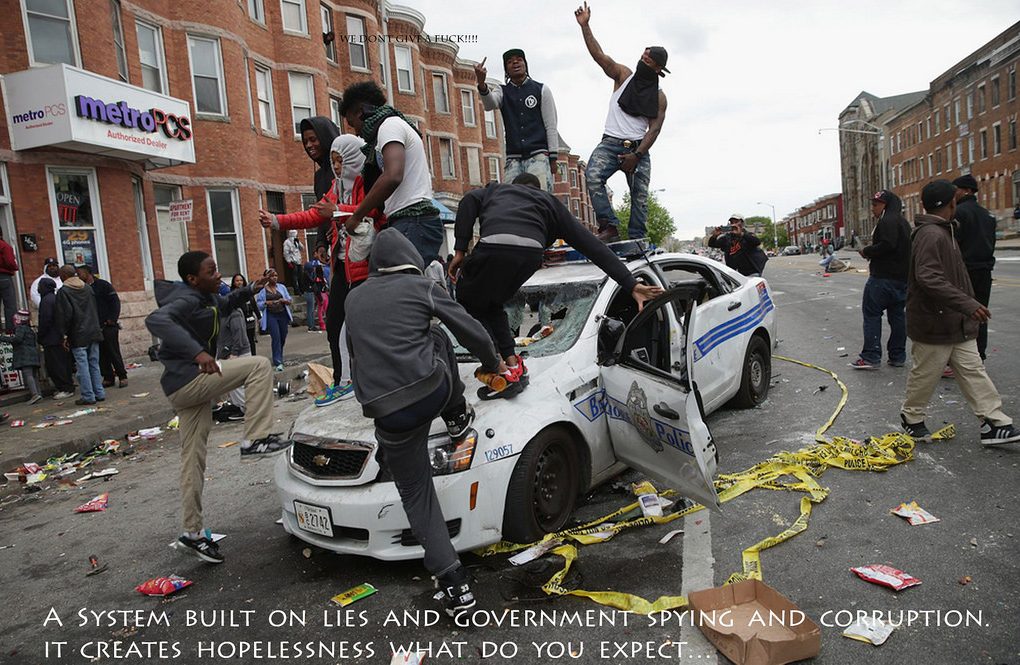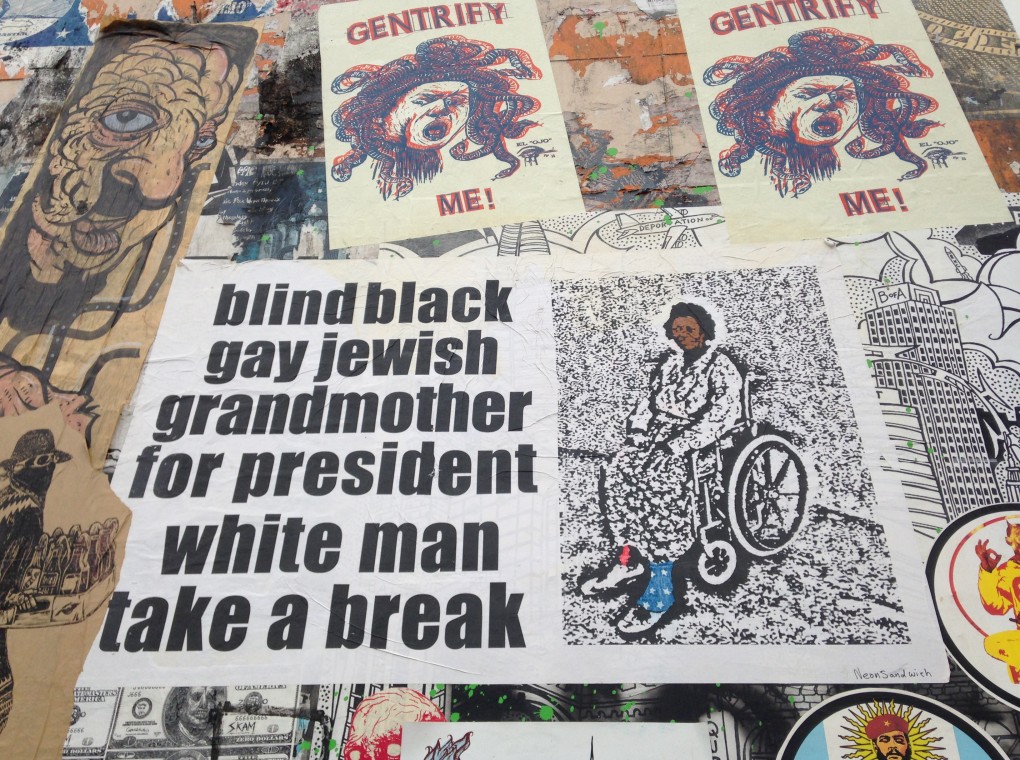This’ll be a hard post to make short, or sweet.
I’ve been struggling since the election’s results to reconcile feelings I have as an “antidogmatist” interested in a strong and broad anti-systemic social movement to remake our political-economic system.
My struggle is mainly between two issues: my longstanding positioning as a “radical”—meaning someone interested in addressing the root of political issues (namely, capitalism) and not merely reforming oppressive systems to make them “less bad”; and my commitment to keeping an open mind with folks who don’t have radical analyses, take radical positions, or participate in radical action—that which I truly believe is necessary to make any substantial transformation in society.
These ideas are coming into conflict because throughout this election and since the election of Trump, U.S. liberals (i.e. non-radicals) around me and in cyberspace have remained stubbornly committed to their existing politics—politics that not only have proven unable to make progressive change, but are also (at least in part) responsible for the horrible situation we find ourselves in, and are now even endangering an effective response to Trump and his ilk.
For those who might identify with the term liberal, and are confused how it might be getting thrown around as a pejorative, please understand that I am using the term in a specific way. I’m not referring to those who believe in the right to maintain and uplift social diversity (e.g. gender, sexual, racial, age, etc). I’m not really referring either to those who abide by the conventional (i.e. British-origin) definition of liberal: those concerned with individual liberties, and a politics based on the notion of individuals converging and hashing out differences in the public/governmental sphere (although that version of liberal definitely overlaps with the one I’m talking about).

What I’m talking about is the liberal who essentially is invested in the political-economic system we have. Liberals believe this system perhaps requires some tweaking in order to achieve more robust outcomes of justice, but ultimately is “the best of all possible worlds”—largely because revolutionary change is dismissed as impossible. Liberals rejecting revolution often also downplay criticism of capitalism and oppose (or at least fail to participate in) action that moves beyond established channels of social choice-making (such as voting, government, or consumer choice).
The liberal I describe is someone who (in the words of Martin Luther King, Jr., a go-to for liberals in many an argument, even if many don’t bother to read him directly or understand his history or analysis):
is more devoted to “order” than to justice; who prefers a negative peace which is the absence of tension to a positive peace which is the presence of justice; who constantly says: “I agree with you in the goal you seek, but I cannot agree with your methods of direct action”; who paternalistically believes he can set the timetable for another man’s freedom; who lives by a mythical concept of time and who constantly advises the Negro [read: any activist] to wait for a “more convenient season.” Shallow understanding from people of good will is more frustrating than absolute misunderstanding from people of ill will.
It is high time that liberals start trying to deepen their understanding of radicalism. In this time of Trump and reactions from below—when violent state suppression is likely to increase and responses from the frontlines likely to radicalize—to hold on as a liberal to liberal thinking is to take sides with the status quo.
I’m over trying to act as a peacemaker between liberals and radicals: this is a time to choose sides and fight, not to have an endless and useless discussion where liberal assumptions are made the baseline (e.g. elections are democratic) upon which radicals have to defend our vision, perspective, and approach. This is the bulk of what I see on “Leftbook”—liberals who don’t actually listen, don’t actually question their own assumptions, don’t seem to read (critical) histories, and don’t seek to look themselves in the mirror.
And please consider: I’m not arguing these are character flaws. I certainly like many of the people who are posting entreaties to convince the Electoral College to change to Clinton, or to demand a recount, or what have you. I’m not saying these people suck—I’m saying their politics are wrong and ill informed, and quite possibly their efforts move counter to their stated values.
As many smarties have said: don’t do the same thing over and over and expect different outcomes.
For those who might think of themselves as liberals but interested in or inching towards radical, I’m offering up below some resources I’ve recently found. The biggest push back I’ve gotten from liberals is the argument that there are not alternative, effective ways of action beyond their suggestions. This is not true, if you’re willing to do the research.
There’s more of this out there than these two links, of course, and I am not vouching for everything within (I’ve barely been able to read much in either link), but these two lists of resources are good starts for those who want to understand radical historical analysis, radical tactics and strategy, and the radical rejection of liberalism.
#TrumpTheRegime: Resources and Ongoing Resistance to Trump and the Far-Right
http://thenewinquiry.com/features/a-time-for-treason/
An excerpt from the latter:
“WE studied and pursued methods for revolutionary social change before Trump came to power, and our core focus remains the same: abolishing the ever-enlarging systems of hierarchy, control, and environmental destruction necessary to sustain the growth of capital. With the ascendance of White nationalist ambition to the upper echelons of empire, we have given special attention to struggles waged and endured by marginalized people for whom the fight against capital has always been a concurrent fight against Anglo-Saxon supremacy.
Although there are bleak times ahead, we must remember that for most of us America was never paradise. Democrats and liberals will use this time to revise history. They will present themselves as the reasonable solution to Trump’s reign and advocate a return to “normalcy.” But their normal is a country where Black people are routinely killed by police and more people are imprisoned than any other place in the world. Their normal is a country where millions are exploited while a handful eat lavishly. Their normal is the opposite of a solution; it’s a threat to our lives.”
I want to believe that liberals can become radicalized. At least, I’d like to see a more concerted “inside-outside” strategy that aligns more radical movements with more liberal ones. But I’ve been seeing that even in this historical moment—with the apparent non-functionality of “democratic” politics, the continued rule of a political-economic elite class, a climate crisis that capitalist states refuse to confront, and the resurgence of populist ideas—liberals don’t seem to be changing much, and are instead largely clamping down on bad ideas (like voting for lesserevilism and continual investment in Democratic Party politics).
More disappointingly, many liberals are into gaslighting radicals as “unrealistic”, “naïve”, “foolish” and “unsophisticated” whenever they present alternative views or critiques. This belittling position, coming often but not always from people of relative privilege in society, is what compels me need to write this blog. In opposing violence (i.e. resistance from underclasses) “on principle” such liberals allow state-sanctioned (e.g. anti-black) violence to go on unimpeded. In redirecting righteous anger back towards reformist avenues that do little to nothing to change the structure of society, liberals prevent the change they supposedly desire. In blaming the victim (often the poorest, the black and indigenous, the most marginal in society) for the outcomes of failed electoral efforts, liberals consolidate the rightward drift of U.S. politics.
In particular, now that Trump has won, emboldening the radical right of white supremacists, xenophobes, and other reactionary social forces, we need more unity to push back from “the Left”. But if “the Left” remains dominated by liberals who oppose street actions, direct actions, protests that interfere with business as usual, property destruction, strikes, occupations, and so on, this push back will fail.
We anti-capitalists and radicals can count on the government to suppress uprisings and dissent, but with liberals as agents of the state, “peace policing” such dissent and insisting on a “more reasonable” return to business as usual, we need even more than ever to assert radicalism and deny the “poverty of liberalism“.
I sincerely hope that some ex-liberal friends join in this effort.

 So maybe it’s a mild 1st degree “bern”, but I’m definitely feeling it. Sometimes I even get excited about Bernie Sanders’ candidacy. Why?
So maybe it’s a mild 1st degree “bern”, but I’m definitely feeling it. Sometimes I even get excited about Bernie Sanders’ candidacy. Why?